- Home
- Jeff Mariotte
Narcos Page 2
Narcos Read online
Page 2
“Of course there is. I feed him information sometimes. I perform minor tasks—nothing that would threaten the safety of civilians, of course, or harm the working people of Medellín. In return, I get information that helps me keep the peace. And I make a little money to supplement my salary. Everybody wins.”
Everybody except those who believe in justice, Aguilar thought. And the rule of law.
He didn’t say it out loud, though. Montoya had demonstrated who he was, and Aguilar didn’t see the point of arguing with him further.
Still they drove. A police radio chattered incessantly, but Montoya seemed to pay it no mind. If he was doing any police work at all, Aguilar didn’t see it. He seemed instead to be playing tour guide, showing Aguilar the sights of the city of his birth.
Some aspects of it, like the Point Zero Bridge and Berrío Park, he never tired of seeing, and he had to admit that Montoya’s capsule history of the city’s criminal past was interesting. Soon, another sight that Aguilar loved—the Iglesia de San Ignacio—loomed ahead of them. Aguilar was Catholic, like most Colombians, and had attended Mass there on several occasions. It was, he believed, the loveliest building in Medellín.
They had almost passed it when the rapid-fire reports of automatic weapons reached their ears. “Guns!” Aguilar cried.
Montoya braked the Nissan, then cranked the wheel and turned into the Plazuela San Ignacio, hitting lights and siren as he did. Now they saw the gunfight under way. Two men were taking cover behind the big statue of Francisco de Paula Santander, and three others were trying to escape, using trees as shelter. One body lay in the street, a pool of blood spreading beneath him. Merchants under broad umbrellas cowered behind their carts.
Montoya brought the vehicle to a shuddering stop, then bolted out his door, whipping his gun from its holster. Aguilar hesitated momentarily. He had practiced this at the academy. He knew what to do. But those were just training sessions, with no actual danger attached. Here, the bullets were real and the people involved were desperate. One man was already bleeding out on the pavement.
His heart pounding, he threw open his door and rolled out of the Nissan. His legs almost gave out beneath him when he hit the street, but he caught himself and drew his Beretta.
Crouching behind a low concrete planter, Montoya fired a couple of shots at the men trying to flee the scene. The two men sheltering behind the Santander statue stepped out and fired bursts from their weapons—an Uzi and a MAC-10, Aguilar thought. Their rounds found a target; the running man jerked spasmodically and fell, knocking over one of the tables at a sidewalk café on the corner. His leg twitched a few times, and then he stopped moving altogether.
The third man had made it around the corner and was gone. Aguilar heard approaching sirens, and was glad that backup was on the way. They still had the two by the statue to arrest, and those men were better armed than he and Montoya.
Instead of turning his weapon toward the gunmen, Montoya holstered it and approached the men with his hand outstretched. One of the men, young and slender, with a mop of dark curls and a wispy mustache and goatee, held the Uzi loosely in his left hand and clasped Montoya’s offered hand with his right. The other guy, blond-haired and green-eyed, heavier, really just a kid, held back and kept the MAC-10 at the ready.
Montoya beckoned Aguilar with a jerk of his head. As Aguilar approached, trembling a little from fear—and maybe a little from excitement at witnessing a real gunfight, up close, and surviving it—Montoya waved at his weapon. “Put that away,” he said. “You don’t need it. The danger’s passed.”
“Are we arresting these men?” Aguilar asked, confused. His ears were still ringing from the noise. The acrid stink of the gunfire sat heavily in the air.
Montoya just laughed. “This is La Quica,” he said, as if that explained everything. “I don’t know the other guy.”
“That’s Snake-eyes,” La Quica said. “He’s new.”
“So is this one,” Montoya said. “First day. He’ll figure out what’s what, sooner or later.”
“Sooner would be safer.” La Quica extended a hand toward Aguilar. “Welcome to the team.”
“I’m Jose,” Aguilar said. Maybe the guy was an undercover officer. “Jose Aguilar Gonzales. Are you… one of us?”
La Quica broke into laughter, and Montoya joined in. Snake-eyes stood back, eyeing the whole scene with suspicion. Aguilar felt the same way. “Depends on which ‘us’ you mean,” La Quica said.
“You guys better get out of here,” Montoya said, cocking an ear toward the oncoming sirens. “Backup’s almost here.”
“I’ll see you get a little something for your trouble,” La Quica said. “Both of you.”
Aguilar almost replied, but a stern glance from Montoya hushed him. The two gunmen walked away quickly, fading into the growing crowd. In a few moments, Aguilar could no longer see them. By the time more police vehicles reached the scene, they were gone, and Montoya was clearing spectators away from the bodies of those they’d shot.
Aguilar watched, crestfallen. Was this what he’d signed up for? Covering for killers and letting them walk away? Taking bribes?
He had wanted to make a difference. To arrest criminals, and make the streets of Medellín safe for honest people.
He still could, he supposed. But he would have to start by turning in his hero, Alberto Montoya. As he watched more cops spill out of their cars, flooding the scene, he wondered if he had the courage.
3
THE NEWLY ARRIVED cops cleared the onlookers away from the scene, and kept them out until a crew came to pick up the corpses. Montoya talked to detectives, but kept them away from Aguilar. That was fine; Aguilar was still wrestling with what he had observed and how to report it. If Montoya was right, who could be trusted?
When he was finished, Montoya came back to him and waved him into the Nissan. Inside, with the doors closed, he said, “Not a word to anyone, understand?”
“What was all that?” Aguilar said, struggling to keep his voice under control. “Those guys just killed two people, and you let them walk away! You shook a killer’s hand!”
“So did you,” Montoya reminded him. “And introduced yourself. You sounded like a nervous schoolboy.”
“I’m an honest man. I’ve never met a murderer before.”
“That you knew about.”
That was true. After all, he had shaken Montoya’s hand just this morning, upon meeting him. For all he knew, Montoya had killed more people than La Quica.
“I guess,” he said.
“Look, kid, I know this is all new to you. But they told me to train you and keep you out of trouble, and that’s what I’m doing. You’re part of this now. You saw what I saw and what I did. You didn’t say anything to the detectives, and that was smart, because you don’t know who’s on which side. Me, I’m on every side. I’m just trying to stay alive and make a little money. You said you’re married, right?”
Aguilar had mentioned Luisa several times during the day. “That’s right.”
“You want her to be safe, right?”
“Of course.”
“Then you’ve already made your decision. You heard what La Quica said. We’ll both get a bonus for letting them go. If you say anything now, your bonus will come in the form of bullets. Maybe you, maybe your wife. Maybe your wife in front of you, after she’s been raped by a few guys. Also in front of you. That’s not what you want, is it?”
Aguilar’s stomach churned. His guts had turned to ice water. “I can’t believe you’re even asking me that.”
“Then you take the money and you keep your mouth shut. You’re a witness now, so you’re either an ally or a liability. Don Pablo’s generous with his friends and deadly to his enemies. Plata o plomo, that’s his motto.”
“But… that was cold-blooded murder.”
“You don’t know that,” Montoya countered. “For all you know, it was self-defense. That doesn’t really matter, though. If we had arrested La Quica and that
other guy—Snake-eyes, I don’t know him—if we had arrested them, they’d be free before we finished writing our reports. If somehow they went to trial, they’d be freed by the judge. But in the meantime, innocent people—witnesses, jurors, and so on—could die.
“Those guys who got killed were bad guys,” he went on. “Drug dealers or worse. They had guns and were in the middle of a shootout in a public plaza. The world’s better off without them. By protecting La Quica, we’re ensuring the safety of citizens who don’t even know the danger we could be in. And we’re ensuring our own safety, and that of your wife. If we made any other choice, we’d have targets on our own backs, and so would everybody we care about. You don’t want your wife to be a widow on your first day.”
“Of course not,” Aguilar said. “But—”
Montoya silenced him with an outstretched palm. “But nothing. I’m telling you how it is, Jose. You can’t deal with the world you wish you lived in. You have to deal with the one you do live in. You can make a difference in people’s lives. You can keep people safe. You can arrest bad guys. But you have to do it within the system as it exists, or the system will chew you up and spit you out, like gum on the sidewalk. Understand?”
“Yeah.” Aguilar crossed his arms over his chest and dropped his chin. He had expected his first day to be exciting, eye-opening, but not like this. In glum silence, he rode out the rest of his shift.
* * *
He hadn’t intended to tell Luisa about the things he’d learned. A woman should be protected from such ugliness, he believed. But she had expected him to come home from his first day on the job inspired, excited by all the things he had done and seen. When instead he was quiet, somewhere between gloomy and numb, she pushed and prodded until he gave up and spilled the whole story. He told her about the envelopes, the gunfight, even what Montoya had told him about the possible danger to her.
“If you want to leave me, I understand,” he said when he was finished. “If you’re not with me, if you’re back with your parents, you might be safe. We could make it look like we had a big fight, that I was furious with you. Then they wouldn’t think that hurting you would bother me.”
The look in her eyes was almost unbearably sad. They’d been sitting at their kitchen table in their cramped hillside apartment, but now she went to the floor, kneeling beside him, and rested her hands on his legs. “Nonsense,” she said. “I’m never leaving you. Not for Pablo Escobar or anyone else. You’re my husband, and I love you. I’m devoted to you.”
“But… they could hurt you. Even kill you.”
“If they do, I just want to be beside you when I die.”
“Baby, please—”
“That’s enough. I’m not going anywhere. You should know me better than that.” She pulled herself up on his legs, then wrapped her arms around his waist. He smelled her hair, like a bouquet of flowers from the shampoo she used, and felt her warmth. Her solidity in his arms was comforting, reminding him of why he had fallen in love with her in the first place. She made him feel like he was where he belonged, no matter where they were. Nothing else in his life had ever had that effect on him.
“Maybe I can quit the police. It’s only—”
She reared back from him. “No! Don’t even say that. You’ve worked so hard.”
“Even if I stay, Escobar surely already knows the things I’ve seen—I don’t think I can just walk away from those. I just want you to be safe.”
“Don’t worry about me. I’ll be fine.”
“You can’t know that.”
She leaned close again, and he stroked her hair as she spoke. “I know you’re an honest man, and you want to live an honest life. That’s part of what I love about you. But I also want you to live a long life. Maybe your friend Montoya is right—”
“He’s not my friend.”
“All right, your partner. But think about it. He says what he did there, letting that guy go, will keep other people safe. People who might never know they were in danger, but who, just by happenstance, end up in a position to harm Escobar. But in the fight you witnessed, nobody was hurt except criminals. Right?”
“That’s right. There were plenty of people there who could have been hurt, but they got lucky.”
“Or maybe Escobar’s men knew what they were doing. Either way, no civilians were hurt. By keeping quiet about it and not trying to arrest someone who would never go to jail anyway, you’re preventing others from being hurt. That’s why you’re a policeman in the first place, right? To keep the public safe.”
“That’s part of it, yes.”
“A big part, I think. So nobody gets hurt instead of who knows how many people getting hurt. And in exchange, you earn some extra money. We can use it, especially when we have a family.”
Aguilar was confused, wasn’t sure he’d heard her right. “Are you saying I should go along with Escobar, Luisa?”
“I’m saying, you didn’t make this world. This is Colombia. From what I understand, this is how Colombia has always been. Maybe if we lived someplace else, it would be different. But we live here. In Colombia. In Medellín. You can’t take on Escobar all by yourself. But if you can conduct yourself honestly, and still make some extra money for your family, what’s the harm?”
“But how can I conduct myself honestly and still take money from a criminal?”
“Just do what you would do normally. Accept that you can’t fix the whole world. Do what you can to help people and keep the city safe. And if once in a while you have to close your eyes or look the other way, is that so bad? That’s what you did today, and it saved lives, didn’t it?”
“According to Montoya.”
“Well, he’s been a policeman a lot longer than you have. He knows how things work.”
“Luisa, are you really asking me to—”
“I’m not asking anything. I’m just saying, you have to put your family first. You have to keep yourself safe. I need you, and the children we’ll have together will need you. So you have to do whatever you have to do. For both of us. All of us. Will you do that?”
When she put it that way, he didn’t have a choice. It wasn’t quite plata o plomo—silver or lead—but it was close.
4
AGUILAR HAD THE next day off, because his next shift was to be at night, so he could learn that routine. He spent most of the day with Luisa, until she had to go to work at Café Parilla Fresco, where she waitressed. They had met there, when he was washing dishes and sweeping the floors.
Then he took a long walk through the barrio. Some kids were playing soccer in a field that would be dark soon. People sat on the steps outside their homes, drinking beer or wine. The smell of marijuana wafted from open windows. Old men sat on benches, gossiping and laughing. Three dogs raced down the street, snarling at each other over a scrap of stolen meat.
In this neighborhood, nobody had much money. He didn’t mind that; he’d never had much, either. He and Luisa had moved here after they got married, and while he attended the academy, she paid the rent from her waitressing job. It wasn’t far from his parents, or from hers—near enough to visit easily, but enough distance to feel like they were on their own. They still belonged to their families, but they were a family themselves, too.
During the day, he had half-expected one of Escobar’s men to show up with an envelope full of cash. When none did, he was surprised to find himself relieved—maybe La Quica’s promise was empty, after all. That would be fine with him.
Between the thousand pesos a week he made as a police officer and her salary and tips, they would do okay. They would never be rich, but who needed the headaches that came with wealth, anyway? If they could put a little bit away, so that Luisa could quit her job when she became pregnant, that would be good. Beyond rent and groceries, they didn’t need much.
As he walked, hands in his pockets, taking in the sights, sounds, and aromas of his neighborhood—somebody was cooking bandeja paisa; he could smell the chorizo and the frying egg—the sun
sank behind the Cordillera Occidental, the mountains to the west, and the sky turned crimson, then purple. The lights of the city spread out below and around him, and he remembered a story his mother had told him when he was a boy, about a blanket of fairy dust that kept sleeping children snug and warm. The lights of Medellín reminded him of that blanket, and he wished it was a real thing. Because he knew that within those lights, some people were safe and warm, eating good food and making love and relaxing, watching television, reading books, enjoying themselves. But others were fighting, plotting, killing, stealing, dealing drugs, hurting themselves or one another. Within those lights, there were people sleeping on sidewalks because they had no shelter, stomachs growling because they had no food. Mothers were crying because their sons had been slain or their daughters had run away or their husbands beat them. The rich worried about keeping what they had and how to get more, the poor worried about having nothing, and everyone in between worried about both.
Aguilar despaired. He was one man, insignificant in the greater scheme. He was a tiny candle in that vast sea of lights, unnoticed by virtually all the others. He had entered the academy somehow believing in his power to effect change, and it had taken only one day to drive that notion from him.
He would just do his best, he decided. The best he could do was the best he could do. Where he could make a difference, he would, and he would learn to accept the rest. Having reached this conclusion—such as it was—he realized how dark it was getting, and he ran to catch a bus to the police station.
When he walked in, three minutes late, he felt like every eye was on him. Weighing him, judging him, finding him wanting. Some thought he was a rat, others thought he was already corrupted. If anyone thought he was still struggling, he didn’t see that in the way their gazes landed on him.
Montoya waited outside, leaning against the Nissan, smoking a cigarette. “You’re late.”
“I’m sorry,” Aguilar said. “Just a couple of minutes. The bus was—”
“Don’t blame the bus. You could have taken an earlier one. You have a responsibility to your partner, the Colombian National Police, and the city of Medellín. Don’t let it happen again.” He threw the cigarette butt to the ground and stepped on it. “Let’s go.”

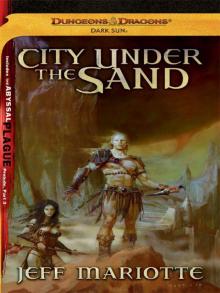 City Under the Sand
City Under the Sand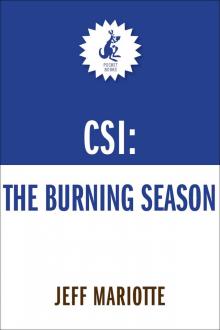 The Burning Season
The Burning Season Sanctuary
Sanctuary Winds of the Wild Sea
Winds of the Wild Sea Serpents in the Garden
Serpents in the Garden Close to the Ground
Close to the Ground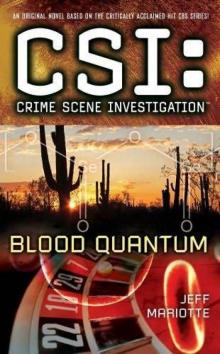 Blood Quantum
Blood Quantum Brass in Pocket
Brass in Pocket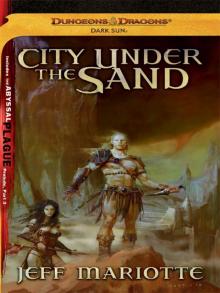 City Under the Sand: A Dark Sun Novel (Dungeons & Dragons: Dark Sun)
City Under the Sand: A Dark Sun Novel (Dungeons & Dragons: Dark Sun)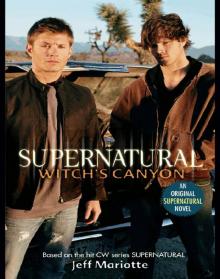 Witch's Canyon
Witch's Canyon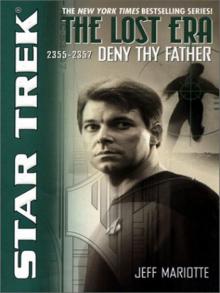 STAR TREK: The Lost Era - 2355-2357 - Deny Thy Father
STAR TREK: The Lost Era - 2355-2357 - Deny Thy Father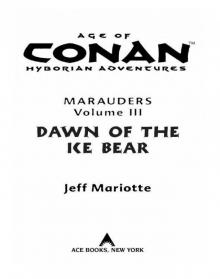 Dawn of the Ice Bear
Dawn of the Ice Bear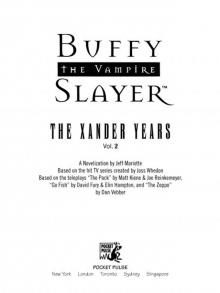 The Xander Years, Vol.2
The Xander Years, Vol.2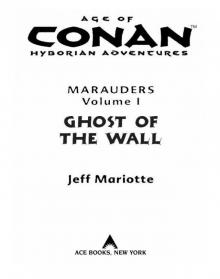 Ghost of the Wall
Ghost of the Wall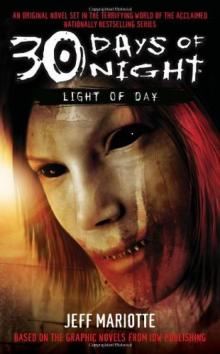 30 Days of Night: Light of Day
30 Days of Night: Light of Day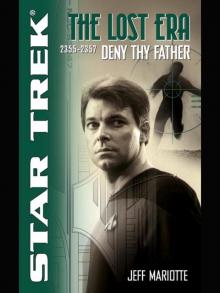 Deny Thy Father
Deny Thy Father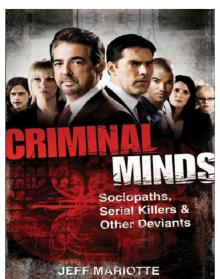 Criminal Minds
Criminal Minds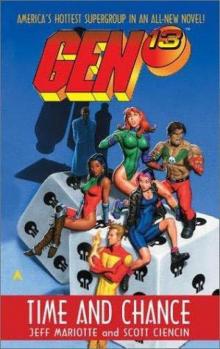 Time and Chance
Time and Chance The Folded World
The Folded World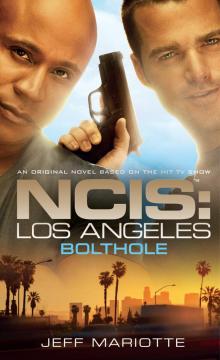 Bolthole
Bolthole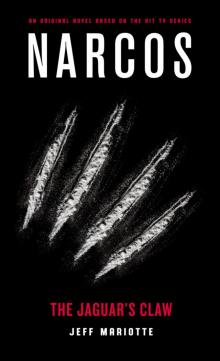 Narcos
Narcos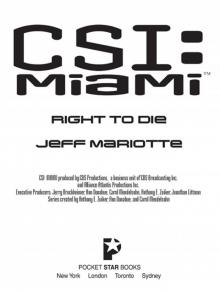 Right to Die
Right to Die